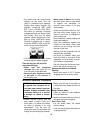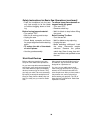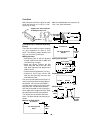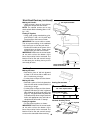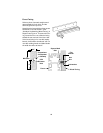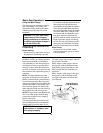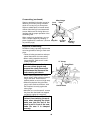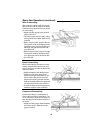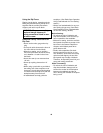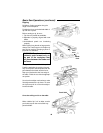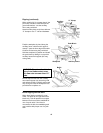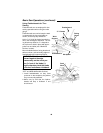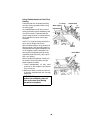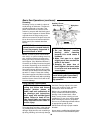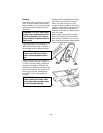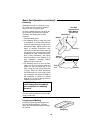
45
Using the Rip Fence
Ripping, bevel ripping, resawing and rab-
beting are performed using the rip fence
together with the auxiliary fence/work
support, push stick or push block.
WARNING: For your own safety,
read and always observe all
safety precautions listed in man-
ual and on saw.
Additional Safety Instructions for
Rip Cuts
• Never use the miter gauge when rip-
ping
• Use a push stick whenever the fence is
2 or more inches from the blade.
• When thru sawing, use an auxiliary
fence and push block whenever the rip
cut is between 1/2 and 2 inches from
the blade.
• Never thru saw rip cuts narrower than
1/2 inch.
• Never rip anything shorter than 10”
long.
• When using a push stick or push block,
the trailing end of the workpiece must
be square. A push stick or block against
an uneven end could slip off or push the
workpiece away from the fence.
• A featherboard can help guide the
workpiece. (See “Basic Saw Operation-
Using Featherboards for Thru Sawing”
section.)
•Always use featherboards for any non-
thru sawing rip type cuts. (See “Basic
Saw Operations-Using Featherboards
for Non-thru sawing” section)
Before Starting:
•To reduce the risk of kickbacks and
slips into the blade, make sure the rip
fence is parallel to the sawblade.
• Before thru sawing, check the anti-kick-
back pawls. the pawls must stop a kick-
back once it has started. Replace or
sharpen anti-kickback pawls when
points become dull.
•Plastic and composition (like hard-
board) materials may be cut on your
saw. However, since these are usually
quite hard and slippery, the anti-kick-
back pawls may not stop a kickback.
Therefore, be especially careful in your
setup and cutting procedures.
While Thru sawing:
•To reduce the risk of kickbacks and
slips into the blade, always push for-
ward on the section of the workpiece
between the sawblade and the rip
fence. Never push forward on the piece
being cut off.



